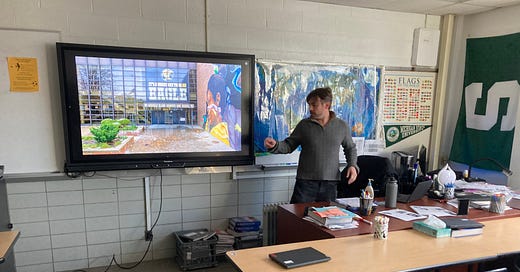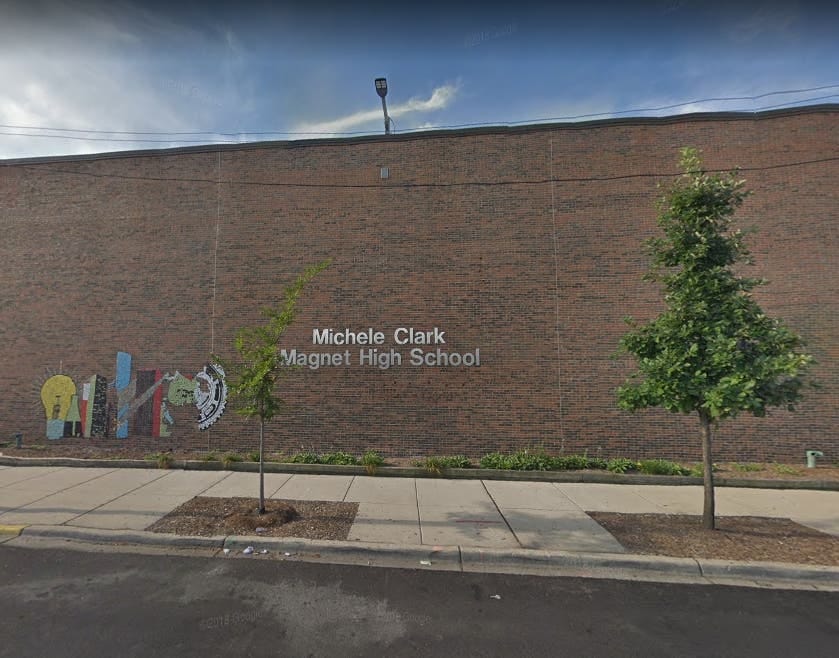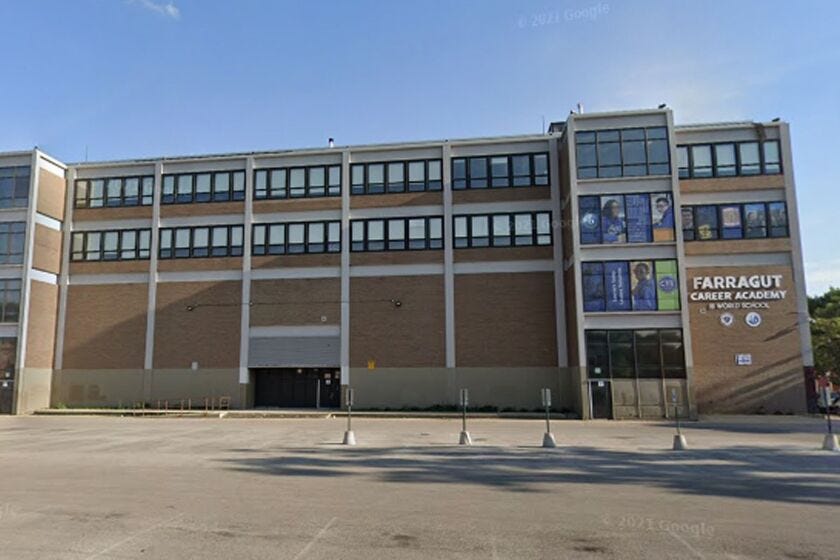James “Jacob” Keith Smith IV became one of my social studies co-workers back in 2014. After moving from Chicago, he modestly wandered into our school only a year after Detroit filed the largest municipal Chapter 9 Bankruptcy in US history (estimated at $18-20 billion) — and a year after Edward Snowden had leaked classified documents proving the NSA had been conducting a massive, continual global surveillance program.
The secret violation of basic privacy rights (i.e. the Fourth Amendment) became an early ongoing discussion topic for us, as we shared the perpetual dilemma of trying to teach global human rights and Constitutional protections in significant decline.
Simply put: an interesting time to be teaching social studies.
Although we would seldom teach the same subject at the same time within our high school, I gradually found a kinship to a younger dedicated teacher, coach and amateur guitarist coming from an urban education background. By not job searching for another district, he didn’t seem too fazed by the additional challenges in often poorly supported pedagogy.
1) Before we begin, could you kindly mention the interesting evolution of your actual name? None of your colleagues knew you as James until your quick story at an ice-breaker circle during an August professional development, a year after you had been working in our school. We all assumed it was Jacob.
Sure. My grandfather, James Keith (James II), wanted me to be James but my great grandfather was James (I), while my father (James III) goes by Jay. I became Jacob, unaware of my real birth name until middle school during class attendance, when the teacher kept calling for James. I went home with some questions. In elementary school my parents probably told everyone, but not middle school.
2) Funny. So, I ask this question of school colleagues more often than a few years ago, but why and how did you end up in teaching (the last refuge of scoundrels)?
Still a great question. My mother was an elementary school teacher, but I reference other reasons. Something about just following in my mother's footsteps doesn't seem glorious enough for me. As a student, I often studied teachers and assumed I could do better, of course. Turns out to be more difficult than many made it seem. In an ever complicated world, education seems to be the one constant good I can return to continually, at least if it's done well, whatever that looks like.
3) Can you tell us about your early years teaching inner city Chicago? I know it's a clichéd question, but how did you deal with the crime in and around your school?
I didn't deal with the crime. You can't. It's always present. High-level criminality typically did not enter the school. Real gang members rarely atttended; when they did it was to recruit. They were not the classroom distruptions. At one school we were not allowed to be on campus after 5:00 due to the violence.
A gunman once held up a teacher at gunpoint in their car during lunch. One morning, I went in a little early and was offered sexual services at the stop sign across the street which I politely declined. Had my car window smashed in at my apartment once, which I understand happened to you this fall (yes, a Detroit resident headache every two or three years).
In Chicago, in order to teach for Chicago Public Schools you must live within city limits. On a teacher salary (to be fair, far higher in Chicago) it is difficult to afford a nice neighborhood within the city.
I remember a middle school student asked me to attend his graduation and he made sure I called him, a kid, for my own safety when I arrived at the parking area. He walked me to his house for my safety.
The world history teacher explaining his Chicago days.
Photo by the author
Michele Clark High, a smaller enrollment magnet school in Chicago. Named after a up-and-coming investigative African American reporter killed in a mysterious 1972 United Airlines disaster (which also claimed the wife of Watergate conspirator E. Howard Hunt), Mr. Smith’s last stop before returning to his Detroit roots.
4) Digging deeper into that experience: like Detroit, Chicago is infamous for mass segregation and inequality, where one lower middle class public school may reside within a couple miles of a much better middle class or upper middle class district. How did you observe these disparities?
Chicago differs from Detroit slightly, as there are a few fabulous schools within the Chicago city limits. Charter schools are also included within Chicago Public Schools rather than separate. Some of these schools seem to be more difficult to get into than many colleges. I never did figure out how to get your child into one of these exclusive Chicago schools.
Maybe you've heard the names; Whitney Young, North Grand, Lane Tech? There are a handful of others. In Chicago, within the same district two schools can differ greatly. I never taught in the Chicago suburbs and I've never taught within Detroit Public Schools, so I am not entirely sure they compare.
When teachers would go out to lunch on the west side, we would always go a couple of miles into the Oak Park suburb of Chicago where we could find your typical lunch chains, Jimmy Johns, Five Guys etc. Quite apparent, the wealth disparity from Oak Park to Chicago.
Leaving my school on Chicago's west side, I could often notice prostitutes waiting in the parking lot. One morning on my way to work, a young lady stopped me asking what I needed. In my ignorance, I didn't still understand what she was asking for quite some time.
5) How did you end up back in Metro Detroit? Can you describe some familiar and new challenges?
I grew up suburban Detroit. The entire time I lived in Chicago I always missed Detroit. The city of Chicago has all kids of excitement, but the Motor City is a special place. My family is here and raising a family in Chicago seemed impossible for financial, emotional and other reasons.
Everyday tasks were far more difficult in Chicago, like groceries, gym workouts, finding parking, not getting my car broken into. Basic day to day challenges like running to the drug store were much more complicated in urban Chicago than in the cozy suburbs of Detroit.
No more gun shots late at night, no drunks driving by recklessly at midnight, or worries about a student getting stabbed in a dark hallway. Nobody passing out under my car to ask politely to move so I can go to work.
Urban school architecture commonly reflects fewer windows near ground levels, including Farragut Career Academy, Chicago (curiously named after the Civil War Vice Admiral who led the liberation of New Orleans and Mobile, Alabama). in 2024, GreatSchools.org designated the poverty-dominated school its poorest rating, a 1 out of 10.
Teaching any social studies in 2025 seems more daunting than ever.
6) What are your concerns about academic freedom, with cancel culture from the right regarding religion and sexuality, and cancel culture from the left, regarding free speech and the limiting of so-called "courageous conversations?" Any examples?
Academic freedom is a small concern. If anything, in social studies, widespread administrative and student apathy has been the much larger issue.
A few years ago there seemed to be a focus on math, English and science, leaving social studies as a practical elective. Nobody seems to be able to figure out how to test an effective history teacher or student on a federal or state level.
What concerns me more revolves around what kind of humans schools are creating. To cancel creativity and health, including music, art, swimming, etc. in exchange for a slightly higher reading score doesn't seem a fair trade for the student.
There’s much more to life than reading fragmented science and mathematics passages. Fortunately, I can't think of any moment where I've honestly been "censored."
I hung a confederate flag next to an American flag during the Civil War unit in my classroom. A few of my African American students did not approve, but no administrator ever mentioned anything. I am annoyed when a YouTube video is censored, yet my current district allows me as the teacher to decide if I want to override the warning and watch it anyway.
I worked at a school with many Arabic students from various countries. I remember one family being disappointed when the teacher specifically pointed out Iran was larger than Iraq. Luckily, nobody seems to care enough (yet) to really discourage such discussions.
7) Teaching any social studies classes in 2025 seems more daunting than ever.
After the frustratingly extended Covid-19 isolation, a prolonged mass media denial over Biden’s ailing health and a horribly mismanaged Democrat ticket, with two protracted wars involving nuclear-armed nations (including an ethnic cleansing of approx. 2 million living in Gaza), combined with a growing distrust of the billionaire class in absolute power (voter turnout in 2024 also dropped to 63.9% from 66.6% in 20201), how do we manage within a crumbling democracy?
How do you reach students who simply may be too overwhelmed with apathy and electronic dopamine distractions?
If I could answer this question I would be flying around the country from school to school being paid vasts amounts of money to share my wisdom. At some point, the entire system of education needs to be drastically modified. As businesses and even factories have made some workable transitions, schools seem to be similar to their industrial revolution predecessors.
I can't compete with a student’s wildest dreams and darkest fears all hiding within their hand. We have so much access to information our job is not about sharing information. We need to be the filter to teach students how to think critically, to build their own filter to sift through the constant drone of "information" flooding into their minds.
8) What are your biggest fears now, first as a parent and second, as a teacher? A similar dread?
As a parent I worry about my daughter living in her phone. I worry about my daughters (four, nine) losing their love and curiosity for learning. I worry they are more fascinated by a green screen "trick shot" than a work of art painted over 100 years. As a teacher, I suppose the fear is similar. Propaganda has more tools than ever so our students really need to know how to delineate fact from fantasy.
9) You also coach soccer, a sport traditionally much more neglected in most metro Detroit high schools than football and basketball. How is your program progressing despite these persistent challenges?
We were admittedly having more success when Middle East conflicts were bringing players from Iraq to our district. We are at a constant disadvantage. There is no soccer program at the middle school and the surrounding areas offer few recreational leagues for kids. Many of my players had some experience as a small child and enjoyed the sport, yet stopped playing for reasons they can't explain. Probably due to lack of leagues or having to start working.
Soccer equipment is often funded by myself, although we did receive a nice donation from the Detroit City Football Club. Some students struggle to obtain physicals and many have poor diets or heart conditions keeping them off the field.
Chicago had similar issues. I remember packing Hispanic kids into my car like the stereotype suggests, driving them all to a field in the south side so they could simply practice.
10) Unlike me, you probably have at least another decade left for full-time teaching. What gives you hope the profession will improve, where you may get some long overdue support? How much optimism do you have helping youth become better thinkers, and not just future disgruntled employees to less-than-fulfilling jobs?
Since the access to so-called information is easier than ever, the role of a teacher by nature has to change. Instead of the holders of information, we now act more as guides through a constant noisy malaise bombarding children and adolescents.
They are never in silence. They can find conflicting information anywhere. With the bombardment of non-stop images and info, we need to act in roles as some type of coach to help them to sort through it all, to reflect and maybe act like they matter.
So, I think I will still be needed in a decade although for different reasons than I needed to be a teacher years ago. As far as occupations go, I don't know. What are the jobs of the future?
I think there will be fewer options than sitting and working at a computer — I hope. Sadly, this question on optimism seems to be the most difficult to answer.
11) I originally emailed you these inquiries before Trump won both the electoral and popular vote. Have you been compelled to make any initial teaching adjustments to this ongoing political reality?
Adjustments have been minimal. Education always seems so slow to change. Everyone talks a big game but our classrooms still look similar, with larger class sizes. Trump’s posturing may bring some changes, perhaps coming soon.
I thought his election might cure some apathy, if only for instinctive self-preservation, but the cell phones, blaring beats, flashing screens and the usual hormones are always most important, regardless who sits in the White House.
Every day, James and I, along with the rest of our devoted staff, continue to struggle with finding real meaning in world more and more dominated by the billionaire class — and their contrived concern for the people, while the massive wealth transfer increases upwards, to other well-to-do districts, to vital corporate interests, indeed, to the plutocrats.
Paradoxically, the multitude of endless diversions from confronting wealth and inequality around such an insecure future still gives us added motivation, to continue the dialogue with each other. . . and our students.
https://www.cfr.org/article/2024-election-numbers







I don't know how one begins Ms to teach anyone to find the truth in the constant glare and noise if phones, TVs, electronics, social media and the massive click bait that spreads so easily through all of it.